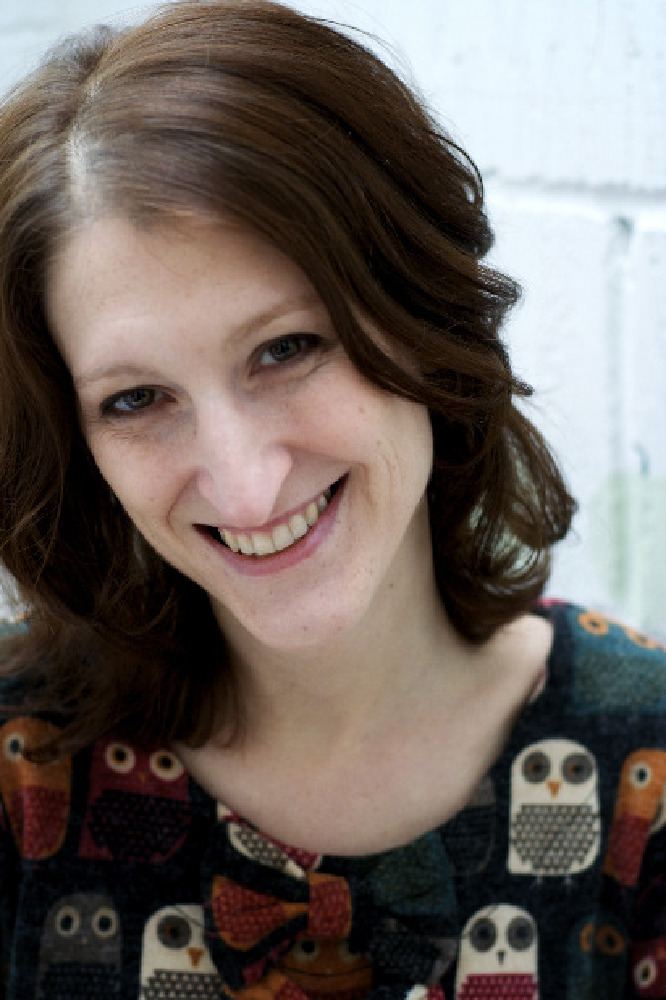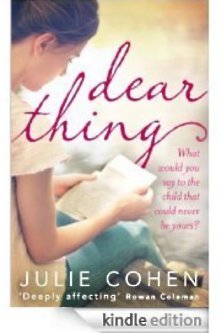
Julie Cohen

Dear Thing is an emotional book about surrogate pregnancy and parenthood. Claire and Ben desperately want a child, but they can't have one. Romily, their friend, offers to be a surrogate for them, but she's not prepared for the emotional implications of being pregnant with Ben's baby. The title, DEAR THING, refers to the letters that are written to the unborn baby, which are scattered throughout the book.
How much has your background in English helped you to write fiction?
Well, the first criteria for being a writer is loving to read, so my reading has definitely helped my writing. But I'm quite an analytical writer, so a background in dissecting and analysing literature really helps me to understand what I'm doing. I was a secondary school English teacher for ten years, and I loved breaking down complex texts into their elements so that students could understand them better and see how they worked; this is a skill I use now when I plan stories, except I start from the basics and work up rather than the other way round. That said, I didn't dare to write for many years, because I was terrified that whatever I wrote could never measure up to the books that I loved reading. Fortunately for me, one day I decided to get over myself and just write and have fun.
When did your fascination with fairies in literature begin?
Strangely, it began with Sherlock Holmes! I was accepted to do a research degree in Victorian children's literature and I was going to focus on Alice in Wonderland, but after a few months I realised that I really had nothing new to say about that book, as much as I loved it. So I started casting about for another topic. I've always been an enormous Sherlock Holmes fan, and I remembered that Arthur Conan Doyle had been involved in a strange hoax involving fairy photographs—the famous Cottingley fairy photographs. I thought it was interesting that an author who had invented the world's greatest detective would be taken in by two young girls and some paper fairy cut-outs, so I started researching the story, and began to link it to portrayals of children and fairies in other books published around the same time. It's a fascinating story and I still have prints taken from the original Cottingley fairy photograph negatives hanging on my wall.
How much did teaching aid your own work?
I love teaching and I was sad to give it up to write full time. Fortunately I'm still able to run workshops for creative writing students, and act as a fiction consultant too. It's always inspirational to meet writers who are determined to learn their craft, and I often find that helping other people with their stories helps me see what's going wrong with mine. I've worked with some really amazing authors over the years, many of whom have gone on to get published; it's such a thrill to share their journey and it really gives me a sense of perspective.
What are your essential pieces of advice for your creative writing students?
Mostly it's this: JUST WRITE! Being a writer is all about writing, but so many people (including me) don't write or don't finish their novels because they're afraid of failure. You really have to let go of that fear and get the words down. If you get it wrong—and you probably will, because that's normal—you can always fix it later.
Please tell us about the characters of Claire and Ben.
Claire and Ben are, from the outside, the perfect couple. They're in love, they both have successful careers, they live in a beautiful home. But they want to start a family and after years of trying, they're starting to define themselves by their failure. Claire wants to give up trying so that they can appreciate what they have together, but Ben can't give up his dream. It was interesting to write their characters because they are truly in love with each other, and yet they have this unhappiness which they deal with in completely different ways, and that leads to a breakdown in communication between them.
What made you want to explore motherhood in the book?
When my husband and I started trying for a baby, I suffered three miscarriages before I finally carried my son to full term. I've spoken to so many women about their experiences of infertility, and I wanted to explore those feelings in a book. Romily, who's the surrogate in the novel, also has a young child of her own, who is just about the same age as my own son, and I wanted to look at that relationship too—a lot of Romily's daughter Posie is taken from real life. Parenthood is the most complex, challenging thing I've ever done, and yearning for parenthood is the most heartbreaking; I hope a lot of readers can identify with some of the emotions that Claire, Ben and Romily experience.
What is next for you?
It's an exciting year! My next hardback, WHERE LOVE LIES, is out in July. It's another emotional book about love, marriage, and memory: Felicity believes she's happily married to a wonderful man, but out of the blue, she catches the scent of frangipani blossom—a fragrance that brings up incredibly vivid memories of a man she passionately loved ten years ago.
I'm also looking forward to some great teaching experiences; I'm a guest tutor on the Random House Writers' Academy online beginning writing course, and I'm leading a day course on writing love stories for the V&A museum. In November, I'm running a writing retreat with one of my favourite authors, Rowan Coleman. And through all of this, I'm going to try to write my next book!

